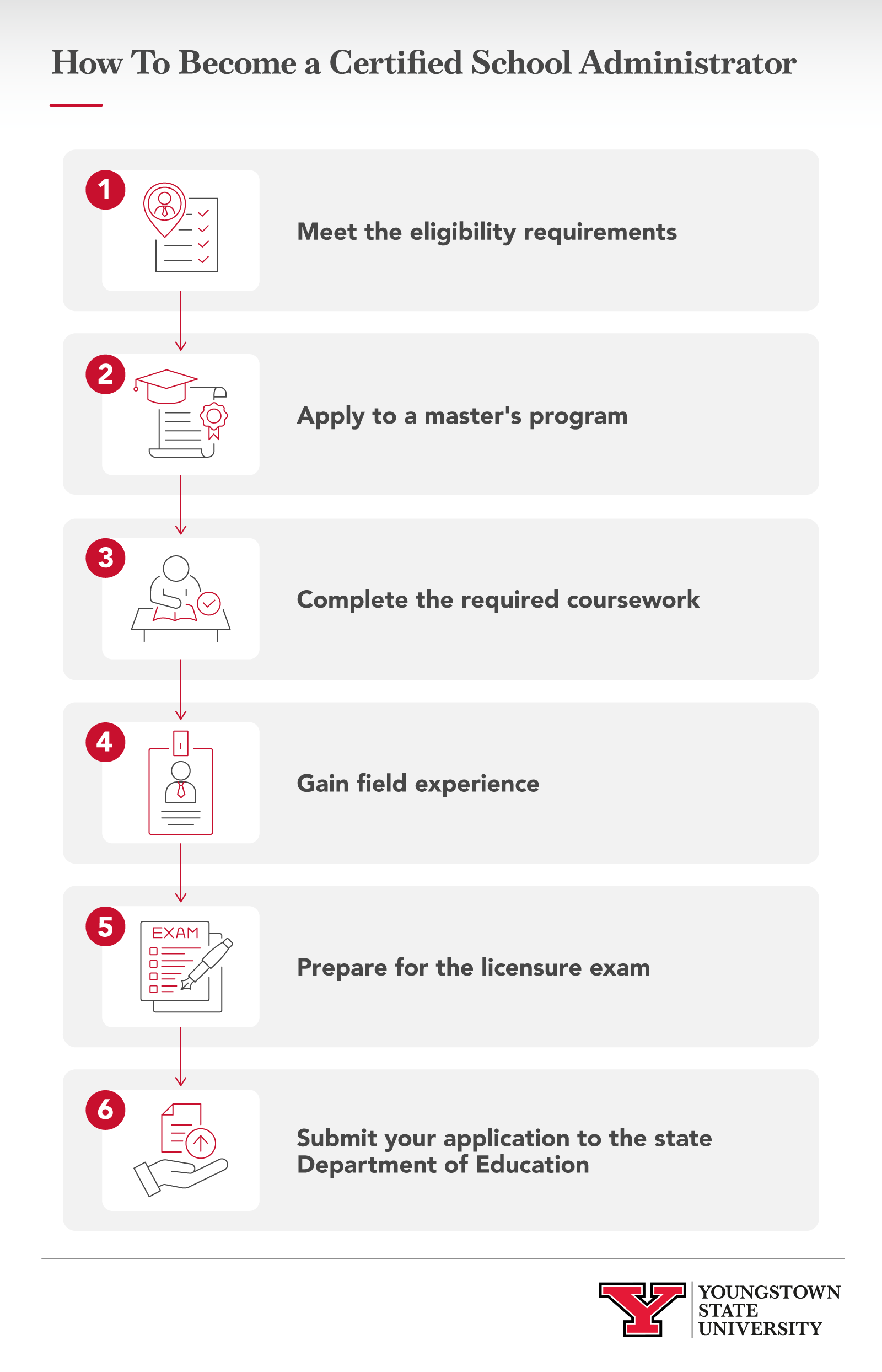
If you’ve got a real passion for teaching and have thought about stepping into a leadership role, earning an educational leadership certification is your next move. This credential is designed for experienced educators who want to influence schools at a higher level, shaping policies and improving student outcomes across entire communities.
Unlike a teaching certificate, which focuses more on classroom instruction, an educational leadership certificate equips you with the administrative expertise required to run a school. It covers everything from legal compliance to data-driven decision-making and helps educators make sense of the complexities of school district management.
The online Master of Science in Education (M.S.Ed.) – Educational Administration with Principal Licensure program from Youngstown State University (YSU) offers a flexible way to earn this credential. It’s a 100% online program that combines practical fieldwork with coursework that meets professional standards. This prepares you for roles like principal or assistant principal. With CAEP accreditation, multiple options for enrollment and a curriculum focused on developing strong leadership skills, the certification gives future school leaders the tools they need to excel in school leadership positions.
Who Needs Educational Leadership Certification?
Not every educator chooses to move into administration. Those who do, however, typically share a desire to shape education on a much broader scale. Data from the National Center for Education Statistics (NCES) shows that nearly 60% of all K-12 principals hold a master’s degree, while only 7% have a bachelor’s degree or lower. This highlights how advanced credentials often serve as the foundation for becoming part of a school’s leadership team. An educational leadership certification is most commonly pursued by the following:
- Teachers who want to transition into leadership positions, such as principal or assistant principal
- Instructional coaches who want to have an influence over curriculum and improve teaching practices
- Department heads who are preparing to step into higher administrative roles within a school district
- Educational leaders who are interested in driving school improvement initiatives across public schools or charter systems
Most educators view earning this certificate as a gateway to new opportunities in instructional leadership and decision-making at the building or district level.
Steps to Becoming a Certified School Administrator
Becoming a school administrator is a process that blends education, practical experience and state requirements. Below are the typical steps you will need to follow to earn licensure and move into an education leadership role:
- Meet the eligibility requirements: Most states require educators to hold a teaching license, have several years of classroom experience and maintain a minimum GPA. These eligibility standards exist to make sure applicants are prepared for the responsibilities of leadership.
- Apply to a master’s program: Enroll in a graduate program, such as Youngstown State University’s online M.S.Ed. – Educational Administration with Principal Licensure. Submit your official transcripts and professional resume and pay the application fee during this step.
- Complete the required coursework: During your master’s degree, you will be taking classes covering topics like school law, equity in education, finance and strategic leadership. This coursework builds the foundation of knowledge every administrator stands on.
- Gain field experience: Most programs require some hands-on practice through clinical placements or practicums. This field experience is important to help you apply theories learned to real-world school settings and strengthen your confidence and leadership skills.
- Prepare for the licensure exam: Each state has its own test to assess administrative competencies. Your program will guide you in reviewing materials and meeting any additional requirements.
- Submit your application to the state Department of Education: After passing examinations and completion of all program requirements, file your paperwork with your state’s Department of Education to obtain your administrator’s license.

Earning certification is not a quick process, but it is a rewarding one. Progress through these steps to build the theoretical and practical insight needed to handle the complex challenges of school administration.
Most importantly, make sure to choose and complete a Master of Science in Education program that’s accredited by the Council for the Accreditation of Educator Preparation (CAEP). That way, you’ll be sure that any successful completion of a course meets the national standards for preparing effective school leaders.
What You’ll Learn in an Educational Leadership Program

An effective educational leadership program goes beyond the theory. It should also equip students with the practical tools needed to manage schools and lead improvement efforts with educational leadership programs.
At YSU, the graduate program in education administration combines advanced coursework with hands-on experience to prepare future administrators to apply leadership theories in real-world settings. The curriculum meets National Educational Leadership Program (NELP) standards and develops the competencies required for today’s school leaders. YSU’s program includes:
- School law and ethical decision-making: Learn how legal frameworks and ethical considerations influence policy and daily operations.
- Instructional supervision and data-driven improvement: Use assessment data to guide teaching practices and support student achievement.
- Human resource leadership: Gain strategies for hiring, staff development and creating positive work environments.
- Strategic leadership and organizational change: Explore how to implement initiatives that drive meaningful change across schools.
- Equity and culturally responsive leadership: Address diverse student needs while promoting inclusive learning environments.
- Finance and budget planning: Understand how to allocate resources and manage funding more effectively.
- Community and stakeholder engagement: Build strong relationships with those around you, like parents, staff and the broader community, to support the success of your school.
For those pursuing the principal licensure option, YSU also integrates coursework in special education law and clinical experiences supervised by licensed administrators. This combination provides graduates of the college of education with the confidence and expertise they need to lead schools effectively.
Why Choose YSU for Educational Leadership Certification
Choosing the right certificate program can make all the difference when it comes to your career growth. YSU offers an educational leadership certificate through its M.S.Ed. – Educational Administration with Principal Licensure that combines flexibility with quality. Designed for busy educators, this graduate program allows you to earn an online degree without having to put your own career on hold. Here’s why so many educators choose YSU:
- State-aligned curriculum: The program meets both NELP and CAEP standards. This means graduates are equipped for administrative roles in any state.
- Flexible online format: The 100% online program suits working teachers who need a schedule that fits their lives.
- Field placement support: Clinical experiences are built into the program, helping students gain the practical leadership skills they need while earning required credit hours.
- Affordable tuition and financial aid: YSU keeps costs reasonable while offering financial assistance to those who qualify, making graduate education more accessible.
- Strong student outcomes: The program focuses heavily on preparing candidates for leadership exams and the realities of managing schools.
With streamlined admission requirements, an online application and options for full-time or part-time study, YSU’s graduate school offers a pathway to leadership that balances quality with convenience. For those who want to go even further, YSU also provides doctoral degrees in the form of online Doctor of Education (Ed.D) – Educational Leadership programs as the next step in advancing your career.
Start Your Journey Toward School Leadership

An educational leadership certification opens doors to new opportunities in administration. It also gives educators the tools to guide schools through challenges and change. With the right preparation, you can take on roles that shape school policies, support fellow teachers and improve outcomes for those who matter most: your students.
The M.S.Ed. – Educational Administration with Principal Licensure online program at Youngstown State University offers a modern and flexible online format, practical field experience and a curriculum built around national standards. With easy enrollment and strong support from faculty, this graduate certificate program makes it possible to grow into a leadership role while continuing to teach.
Request more information and apply today to start building the skills to lead with confidence. If you’re ready to take the next step, explore YSU’s online M.S.Ed. – Educational Administration with Principal Licensure program.
FAQ
Educators often have questions about earning an educational leadership certificate. After all, it’s a major step in any teacher’s career path. Here are answers to some of the most common ones.
How do I get an educational leadership certificate in my state?
To get an educational leadership certificate in your state, you will need to earn a master’s degree, complete leadership-focused coursework and pass a state-approved exam. Most states also require meeting-specific eligibility criteria through the local Department of Education to qualify for licensure.
Can you teach with an educational leadership degree?
Yes, you can teach with an educational leadership degree. The credential is aimed more at preparing educators for school leadership roles, but those who hold teaching licenses can, of course, continue to teach. Many use the degree to expand their existing responsibilities while pursuing future administrative positions.
How do you get into educational leadership?
The typical path to educational leadership begins with being a licensed teacher who gains classroom and mentoring experience. From there, candidates enroll in a certificate program or graduate program in educational administration and complete all the requirements for licensure. These steps help to build up the expertise and confidence needed to move into leadership roles in educational settings.


